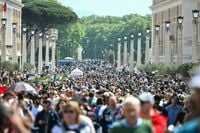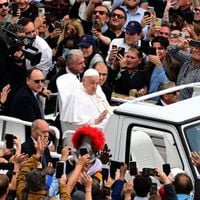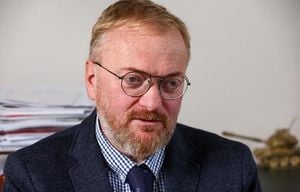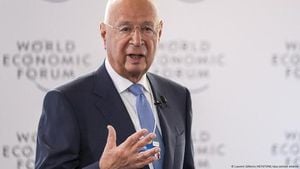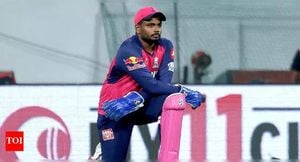Pope Francis, the 266th pope of the Roman Catholic Church, passed away on Monday, April 21, 2025, at the age of 88, as announced by the Vatican. His death marks the end of a significant chapter in the history of the Catholic Church, particularly as he was the first Jesuit and the first Latin American to hold the papacy.
Born Jorge Mario Bergoglio in Buenos Aires on December 17, 1936, he was known for his humble beginnings and commitment to social justice. Throughout his papacy, which began on March 13, 2013, he championed the causes of the marginalized and the poor, often emphasizing the importance of compassion and dialogue across faiths.
In his final public appearance just a day before his death, Pope Francis greeted thousands of faithful gathered in St. Peter's Square for Easter Sunday celebrations. Although he appeared frail and was in a wheelchair, he offered heartfelt Easter wishes, stating, "Happy Easter to all!" His presence was a poignant reminder of his dedication to his role, even as his health had been declining.
The Vatican confirmed that Pope Francis died from complications related to bilateral pneumonia, a condition from which he had been recovering since his hospitalization on February 14, 2025. Despite his health challenges, he remained active in his duties, addressing global issues such as rising anti-Semitism and the humanitarian crisis in Gaza during his last public message.
"No peace is possible without religious freedom or freedom of thought," he remarked, urging world leaders to prioritize compassion over fear and division. His calls for peace and understanding resonated deeply, reflecting his commitment to a more inclusive and humane world.
Following the announcement of his death, tributes poured in from around the globe. French Prime Minister François Bayrou praised him as a man who "was not afraid of anything" and aimed to reform the Church to better serve the poor. Bayrou noted that Pope Francis had initiated a historical shift within the Church, focusing on inclusivity and social justice.
World leaders, including Ukrainian President Volodymyr Zelensky, expressed their condolences, highlighting the Pope's prayers for peace in Ukraine amidst ongoing conflict. Zelensky referred to him as a spiritual leader who consistently advocated for the vulnerable.
The White House also issued a statement, saying, "May Pope Francis rest in peace," accompanied by images of the Pope meeting with past U.S. leaders. The sentiments echoed globally, with leaders from Russia to Spain acknowledging his contributions to interfaith dialogue and humanitarian efforts.
Spain declared three days of official mourning, while in Paris, the Eiffel Tower was set to be turned off in tribute to the Pope. The bells of Notre-Dame Cathedral rang 88 times in homage to his 88 years of life, marking a somber moment for the city and the Catholic community worldwide.
As the Vatican prepares for the funeral, which will take place four to six days after his death, the Pope's body will lie in state at St. Peter's Basilica. This will allow hundreds of thousands of faithful to pay their respects. Notably, Pope Francis had expressed a desire to be buried in the Basilica of Saint Mary Major, a significant departure from the tradition of papal burials at St. Peter's.
In the wake of his passing, discussions surrounding his legacy have begun. Many remember him as a champion for the poor, often referred to as the "Pope of the Poor." He consistently challenged the status quo, advocating for reforms within the Church and addressing issues such as climate change, migration, and social inequality.
His papacy was marked by a series of significant reforms aimed at modernizing the Church's approach to various social issues. He initiated changes in the governance of the Vatican, emphasizing transparency and accountability, particularly in light of the sexual abuse scandals that have plagued the Church.
Throughout his tenure, he maintained a focus on the importance of humility and service, famously stating, "My people are poor, and I am one of them." This sentiment resonated with many, as he often sought to bridge gaps between different communities and foster a spirit of fraternity.
As the world reflects on Pope Francis's contributions, his calls for compassion and understanding in a divided world will likely continue to inspire many. His legacy as a reformer, a voice for the voiceless, and a leader committed to peace will be remembered for generations.
The coming days will see a multitude of memorial services and tributes, as people from all walks of life gather to honor a man who dedicated his life to serving others. A mass in memory of Pope Francis is scheduled for Wednesday, April 23, 2025, at the Church of the Holy Sepulchre, a fitting location for a leader who emphasized the significance of faith and community.
In the wake of his passing, many are left to ponder the future of the Catholic Church and who will take up the mantle of leadership. The process of electing a new pope will begin soon, as the Church enters a period of mourning and reflection on the profound impact of Pope Francis's life and work.
